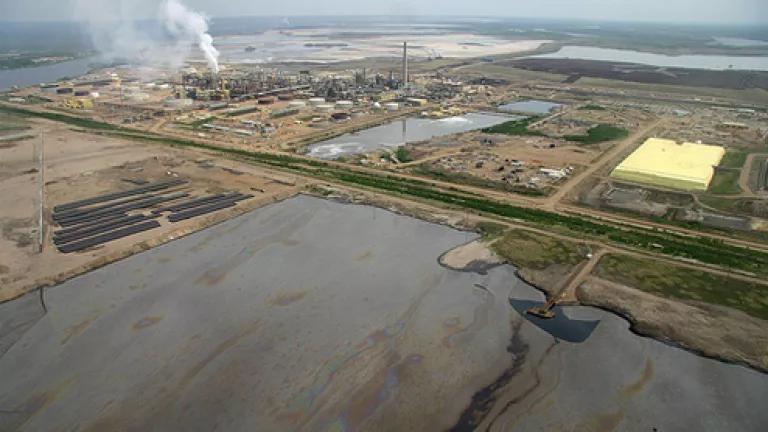
Yesterday in Canada, one of the tar sands oil giants went to court to defend itself. The charge: killing 1,600 ducks. The oil company: the aptly named Syncrude a joint venture whose owners include ConcoPhillips, ExxonMobil and Murphy Oil. Their defense: not guilty, they claim. The birds did die in the waste lagoon, but we are above the law. Trial: throughout March and April.
I reported on the start of this case a year ago here. As shown in NRDC’s report on the impact of tar sands on migratory birds, tailings ponds may cause the deaths of 8,000 to 100,000 birds every year, most of which go unreported. The glittering waters of tar sands open waste dams already span 50 square miles of what used to be Alberta’s Boreal forest and wetlands.
These ducks were flying to nesting grounds in spring 2008 when they landed and died in Syncrude’s tar sands waste dam. I flew over the tar sands most recently last summer. The Syncrude tailings ponds stretch out for miles in the sun. I can imagine for a duck, it would be like the siren’s call: attractive, but deadly. Each spring more than half of America’s birds flock to the Canadian Boreal forest to nest. The Boreal forests and wetlands provide safe nesting habitat for songbirds and waterfowl. Yet almost all the biggest oil companies strip-mine these critical forests and wetlands . They are literally scraping away the trees and gouging out the wetlands to reach a tarry substance called bitumen. With a high cost in water and natural gas, bitumen can be turned into synthetic crude oil and from there into gasoline and diesel. Athabasca River water is heated and used to separate the bitumen from the sand after it is dug up and the water waste – now contaminated with bitumen and other contaminants sits for years behind open dams of waste.
Bird watchers in the United States say no to tar sands oil, when they learn that the United States is on the brink of helping expansion of the tar sands mines and operations that destroy and fragment bird nesting habitat. Oil companies try to make tar sands sound attractive, clean and safe. But it is impossible to make the abrupt death of 1,600 ducks sound like anything but what it is: the sign of an industry whose destructiveness is not worth it.
If convicted, Syncrude faces fines of nearly $800,000. Oil industry profits mean that companies can likely pay a fine of this level without pain. Since the 1,600 ducks died nearly two years ago, new requirements for industry to deal with its wastewater are in place. Yet, most companies are not taking even these new and weak requirements seriously. Syncrude has accumulated more liquid tailings than the whole of the industry put together – about 132 billion gallons of the total 221 billion gallons in 2010. And yet, true to form, Syncrude has submitted tailings management plans that will not comply with these new requirements, and has some of the weakest plans of any tar sands oil operator.
Clearly, we need more. Oil companies need to clean up the tailings waste ponds. They need to be held accountable for their pollution so that it does not harm bird habitat, forests, wetlands, rivers, and the public health of downstream communities.
Tar sands expansion will continue along its destructive path until its main market – the United States – says no to more bird deaths, no to new pipelines, no to expansion of refineries, and yes to clean energy solutions for our transportation needs.
For more on the duck trial, see the blog from our colleagues at the Pembina Institute.

